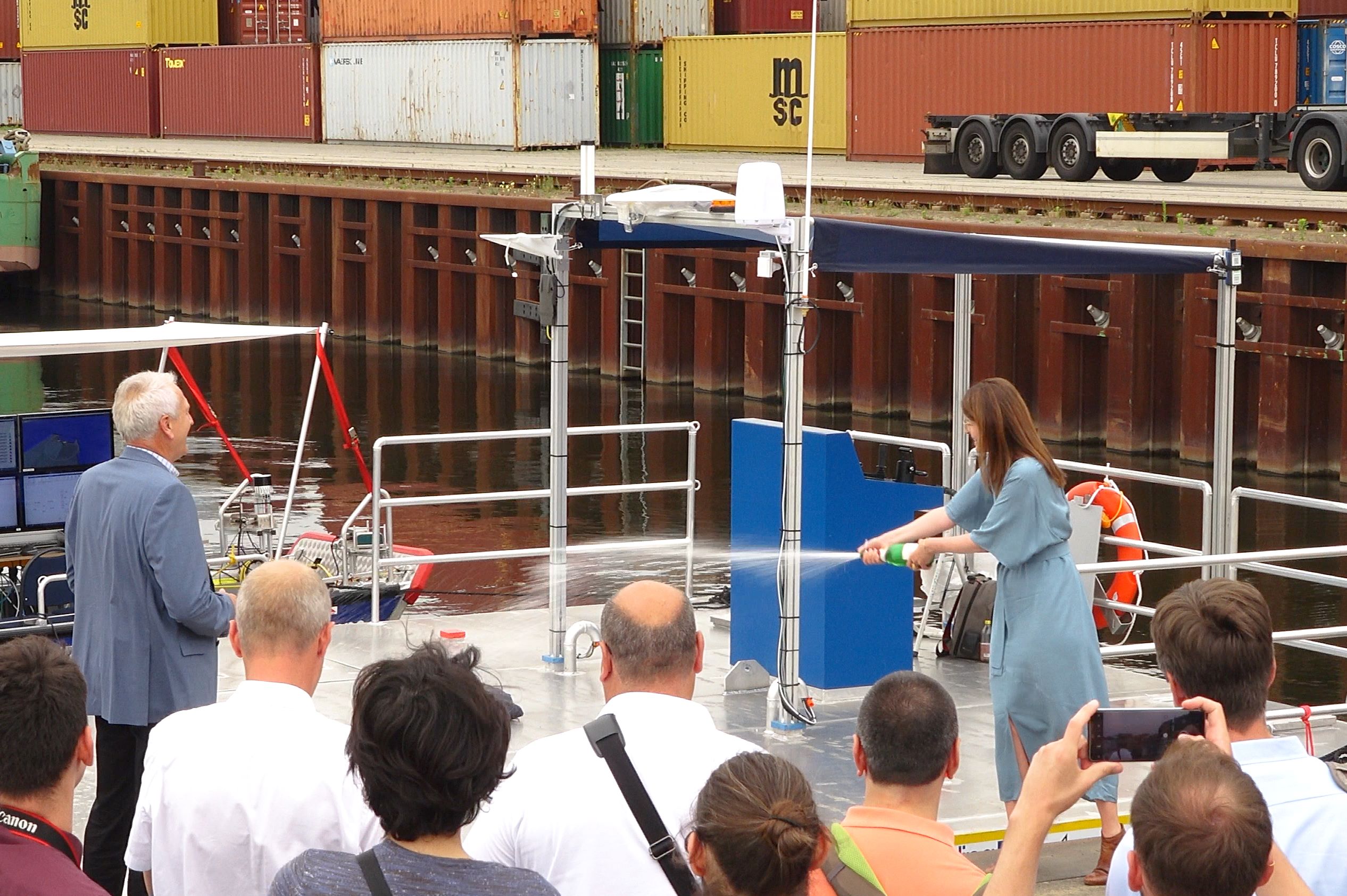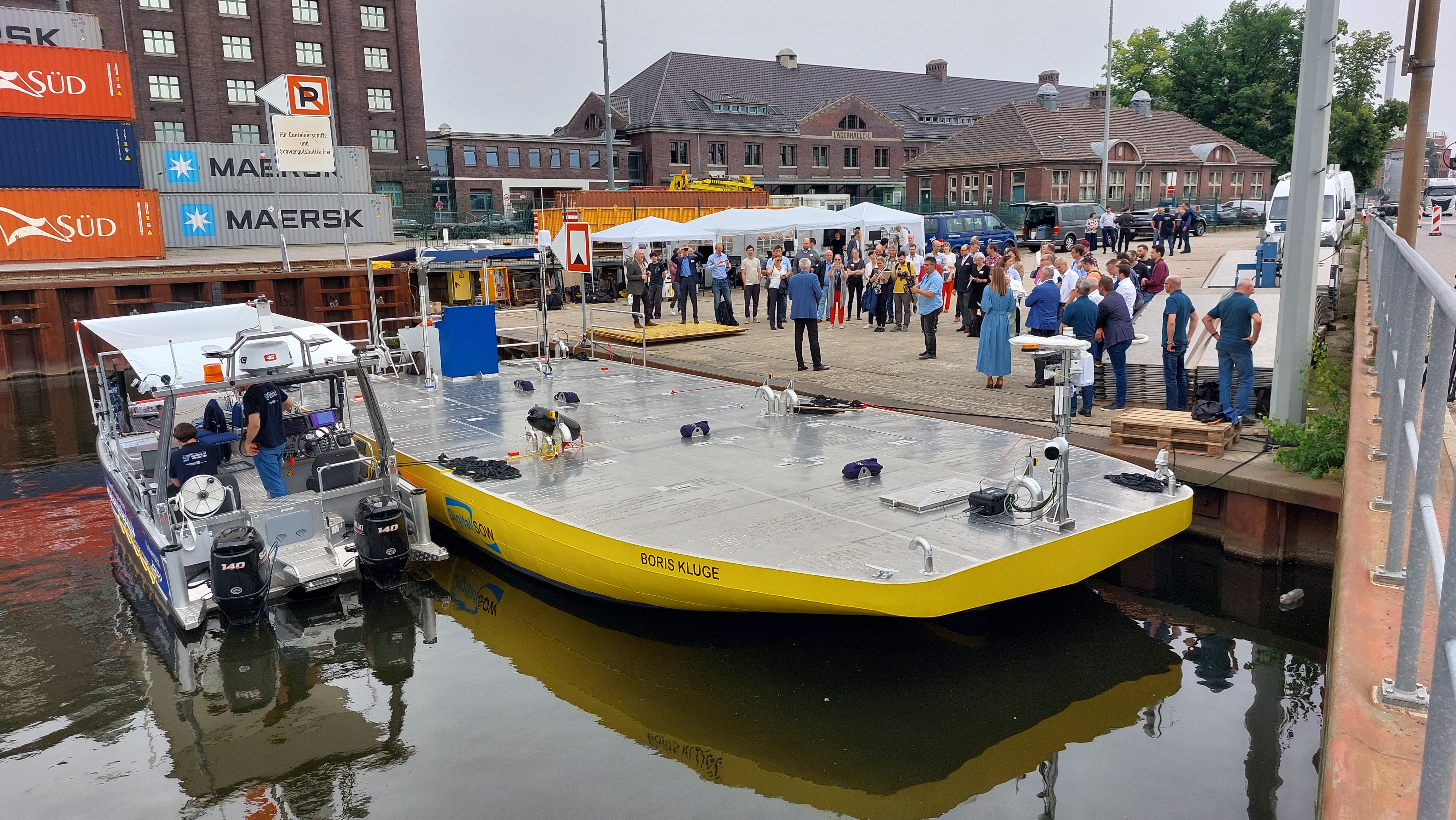 About us
About us
24/06/2024
DigitalSOW future project successfully completed
Naming ceremony of the test vessel ‘Boris Kluge’ as a new test platform for highly automated and connected navigation on the Spree-Oder waterway (SOW)
The joint DigitalSOW project was launched in June 2021 with the aim of developing and testing new transport and logistics
concepts for supply and disposal in the Berlin metropolitan region via waterways in a digital test field. After three years, the project,
which was funded by the Federal Ministry of Digital and Transport as part of the funding guideline for the development of digital test
fields on federal waterways (DTW 1), was completed.
The project consortium, consisting of Alberding GmbH in Wildau (consortium leader), the Institute of Communication and Navigation of the
German Aerospace Center (DLR), the Schiffbau-Versuchsanstalt Potsdam GmbH, the Department of Design and Operation of Maritime Systems at
the Technical University of Berlin, the Institute of Automation Technology at the University of Rostock and the Verein für europäische
Binnenschifffahrt und Wasserstraßen e.V., presented the results at the final event on 21st June 2024 in Berlin's Westhafen.
A special highlight was the ceremonial naming of the test vehicle developed in the project by Martina Kohlhaas, Ministerial Director
at the Federal Ministry of Digital and Transport. ‘Completing the DigitalSOW project is another milestone in the mobility and transport
revolution. Forward-looking projects like this can be used to develop innovative concepts for shifting transport to the waterways.
This is a particularly important topic for metropolitan regions’, says Martina Kohlhaas.

With the naming ‘Boris Kluge’, the consortium would like to honour the memory of the managing director of the
Bundesverband Öffentlicher Binnenhäfen e.V., one of the initiators of the digital test field in Berlin, who passed away far too early.
The ‘Boris Kluge’ will be used in future projects as a test platform for the practical testing of highly automated and networked driving
and mooring on the Spree-Oder waterway.

Driven by the vision of relieving metropolitan traffic and shifting the flow of goods to waterways with zero emissions,
the DigitalSOW project defined new transport process models for city logistics and looked at solutions for automated transhipment.
Decentralised transhipment points and a charging infrastructure were part of the investigations. The control centre developed in the project is used
to record the traffic situation and remotely control the test vehicle. The new AIS/VDES procedure was used for communication with the test vessel
and backup positioning.
On board, systems for determining the ship's position and surroundings, backup positioning (R-mode) and automated control were implemented.
Due to delays in the completion of the test carrier, the system was tested on the waterway with the ships of the project partners ‘Aurora’ (DLR) and
‘Bernhard Lampe’ (University of Rostock). The University of Rostock's ship was also equipped with new drives (RIM drives) to harmonise the control
system with the test carrier's drives.
The central component of the project was the development and production of a test vessel customised for city logistics in the Berlin metropolitan
region. With the ‘Boris Kluge’, a demonstration platform is now available for practical tests of a new, innovative type of transport via inland
waterways specifically for the supply and disposal of metropolitan regions. The modular test vehicle consists of a bow and stern section that can
operate individually and in combination. They can be coupled and decoupled to form larger units and are equipped with state-of-the-art sensor
technology.
The future focus will be using the ‘Boris Kluge’ to research and test zero-emission, intelligently networked and autonomous vehicles. Initial
practical trials are planned in the SensorSOW (BMDV, DTW2) and A-SWARM II (BMWK) projects. Further projects and tests with users from the logistics
sector are planned.
Further information on the DigitalSOW project and the results presented can be found on the website
www.digitalsow.de.
















